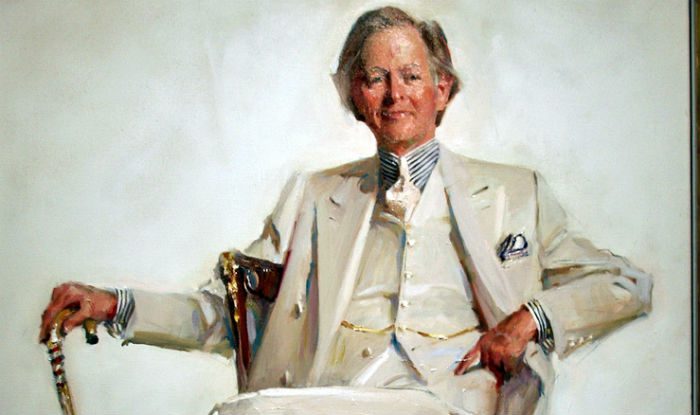 Journalist, essayist and novelist Tom Wolfe died on May 14 at the age of 88. Among his most famous books are “The Right Stuff,” about the U.S.’s early astronauts, and the New York-set satirical novel “The Bonfire of the Vanities,” but he is equally renowned for his facile use of language and his iconoclastic ideas.
Journalist, essayist and novelist Tom Wolfe died on May 14 at the age of 88. Among his most famous books are “The Right Stuff,” about the U.S.’s early astronauts, and the New York-set satirical novel “The Bonfire of the Vanities,” but he is equally renowned for his facile use of language and his iconoclastic ideas.
The Southern-born Wolfe was nearly as famous for signature style, centering on his love of white or light blue suits and, often, a hat.
You can read biographies of Wolfe today in many places, such as here and here and here.
But as any writer would prefer to be known for his or her words rather than his or her fashion (and if they’d rather be known for fashion, that can get in the way of good work), for our purposes, I’d like to point you to just a few things Wolfe said or wrote (and BTW, of Wolfe’s personal religious beliefs, my research only revealed that he went to an Episcopalian boys’ school, and not much more beyond that).
From a 2016 Wall Street Journal piece called “The Faith of John Glenn” (who took communion on the Moon):
“I am a Presbyterian,” he says, “a Protestant Presbyterian, and I take my religion very seriously, as a matter of fact.” He starts telling them about all the Sunday schools he has taught at and the church boards he has served on and all the church work that he and his wife and his children have done. “I was brought up believing that you are placed on Earth here more or less with sort of a 50-50 proposition, and this is what I still believe. We are placed here with certain talents and capabilities. It is up to each of us to use those talents and capabilities as best you can. If you do that, I think there is a power greater than any of us that will place the opportunities in our way, and if we use our talents properly, we will be living the kind of life we should live.”
A power greater than any of us! From the lips of a flying jock!
…
Yet for all of this, I never see mention of Glenn’s importance in the religious history of the United States. In the late 19th century, Nietzsche uttered his famous dictum “God is dead,” referring to the decline of Christianity among educated, well-to-do people in Europe, and the death throes had spread to America after World War I. Here, religion limped osteoporotically through the rest of the century, but America remains the most religious country outside of the nations of Islam. Glenn’s religiosity, amplified by the tremendous, Zeus-like success of the space program—which became his voice—may have slowed down the grim slide. Where it will all come out, of course, God only knows.
From a 1976 New York Magazine piece called “The ‘Me’ Decade and the Third Great Awakening”:
Today it is precisely the most rational, intellectual, secularized, modernized, updated, relevant religions—all the brave, forward-looking Ethical Culture, Unitarian, and Swedenborgian movements of only yesterday—that are finished, gasping, breathing their last. What the Urban Young People want from religion is a little Hallelujah! . . . and talking in tongues! . . . Praise God! Precisely that! In the most prestigious divinity schools today, Catholic. Presbyterian, and Episcopal, the avant-garde movement, the leading edge, is “charismatic Christianity” . . . featuring talking in tongues, ululation, visions, holy rolling, and other nonrational, even antirational, practices. Some of the most respectable old-line Protestant congregations, in the most placid suburban settings, have begun to split into the Charismatics and the Easter Christians (“All they care about is being seen in church on Easter”). The Easter Christians still usually control the main Sunday-morning service—but the Charismatics take over on Sunday evening and do the holy roll.
This curious development has breathed new life into the existing Fundamentalists, theosophists, and older salvation seekers of all sorts. Ten years ago, if anyone of wealth, power, or renown had publicly “announced for Christ,” people would have looked at him as if his nose had been eaten away by weevils. Today it happens regularly . . . Harold Hughes resigns from the U.S. Senate to become an evangelist . . . Jim Irwin, the astronaut, teams up with a Baptist evangelist in an organization called High Flight . . . singers like Pat Boone and Anita Bryant announce for Jesus . . . Charles Colson, the former hardballer of the Nixon administration, announces for Jesus, and the man who is likely to be the next president of the United States, Jimmy Carter, announces for Jesus. Oh Jesus People.
And lastly, from a 1996 Forbes article called “Sorry, But Your Soul Just Died,” a long exposition on neuroscience, the Darwnist theory of evolution (Wolfe found the theory inadequate), and the state of contemporary science in general, which ends with:
Recently I happened to be talking to a prominent California geologist, and she told me: “When I first went into geology, we all thought that in science you create a solid layer of findings, through experiment and careful investigation, and then you add a second layer, like a second layer of bricks, all very carefully, and so on. Occasionally some adventurous scientist stacks the bricks up in towers, and these towers turn out to be insubstantial and they get torn down, and you proceed again with the careful layers. But we now realize that the very first layers aren’t even resting on solid ground. They are balanced on bubbles, on concepts that are full of air, and those bubbles are being burst today, one after the other.”
I suddenly had a picture of the entire astonishing edifice collapsing and modern man plunging headlong back into the primordial ooze. He’s floundering, sloshing about, gulping for air, frantically treading ooze, when he feels something huge and smooth swim beneath him and boost him up, like some almighty dolphin. He can’t see it, but he’s much impressed. He names it God.
Requiescat in pace, Tom Wolfe.
Here is Wolfe in 2013 discussing a recent novel, “Back to Blood”:
Image: Thomas Kennerly Wolfe, 2000, Oil on Canvas by Everett Raymond Kinstler, housed at the National Portrait Gallery; posted on Flicker by Cliff; used under Creative Commons License 2.0.
Don’t miss a thing: head over to my other home, as Social Media Manager at Family Theater Productions; and check out FTP’s Faith & Family Media Blog, and our YouTube Channel.













